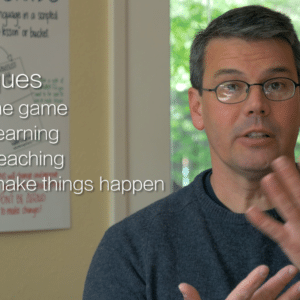You’re fluency hunting, and to maintain game flow and momentum, you call “How Fascinating!” every time you or another player gets stuck or struggles. You also call “How Fascinating!” to celebrate learning milestones as they whiz by.
“Out beyond right doing, and wrong doing, there is a field – I’ll meet you there.” – Rumi
Whether it’s years of institutional schooling, institutional workplaces, or perhaps an unforgiving family culture, many (if not all) new WAYK players arrive with some degree of concern (from mild to neurotic) over getting things “correct” and avoiding being wrong. They may hesitate to fully play due to the possibility of making mistakes, and then furrow brows and hunch over when they feel they’ve made one, perhaps even culminating in a magnificent single or (double!) facepalm.
In the beginning, before they’re used to the culture of game play, new players may even shut their eyes, shutting off all help from players trying to pull them through it by being angels on their shoulders, as they wrack their brains for the “right answer”.
In a sense, many new players arrive skilled in a comprehensive, but completely mismatched, set of “rules of the game” that they have learned at school, work, and home. Rules that single out errors as a focus of concentration, rules that remove the possibility of mutual help, support, and collaboration. They may have learned these rules well, but these are not the rules of WAYK.
In WAYK game play, we’re playing “wrong” from the first moment, guided by technique Mumble (“close enough is good enough”). The burden of perfection is enough to crush any game. WAYK therefore provides an array of techniques to release the obligation of correctness and perfection, like Let it Go, Mumble, Correct One Thing. The more tools to support free play, the better, and “How Fascinating!” plays a key role in this.
We first witnessed “How Fascinating!” in a video presentation by speaker and music conductor Benjamin Zander, and immediately tried out his innovation in a WAYK game. We’ve since run into other versions – like the “Failure Bow” from improv theater.
Technique “How Fascinating!” changes for different languages, signed and spoken, but the energy of it is always essentially the same. We perform it as a full body, graceful, slow motion, backwards-stretching reverse bow (like trying to touch the back of your heels with your fingertips by reaching over your head), and simultaneously an unplanned group “wave” as everyone copy-cats the first person to call “How Fascinating!”.
WAYK, in the end, is only concerned with what works. And “How Fascinating!” works – dispelling personal and group tension, and making the pursuit of correctness just a little bit too ridiculous to take seriously.
Introducing the technique
Short: “Technique: ‘How Fascinating!’. Call “How Fascinating!” every time you or another player gets stuck or struggles. You also call “How Fascinating!” to celebrate learning milestones as they whiz by.”
Applying the technique to language acquisition
This is another technique to use early and often.
- “How Fascinating!” is a skill – call it early, and often, and don’t skimp on doing the full “failure bow” of it. Players will often want to rush by “how fascinating!”, thinking they don’t need it. Everyone can use some practice with applying “How Fascinating!” to their life.
But what about…?
If players are too serious and rigid, or reluctant to call “how fascinating!”, or slow to copy-cat others’ call of “how fascinating!”, set aside a moment to combine this technique with tq In Threes and tq Copy-cat. After a round (or three) of the entire group copy-catting the game leader as they call “How Fascinating!” three times in a row, the group usually surrenders to fun and free play of the game.
- tq You Go First – your energy and application of “How Fascinating!” will set the culture of the group.
- tq Overdo It – make “How Fascinating!” as ridiculous as possible, so that no one can take their mistakes seriously.
- tq Mistakes and Milestones – “How Fascinating!” applies to both, mix them up in the players’ minds so that “failure” truly feels like “success”, a vital element of accelerated learning.
- tq It’s a Copy-cat Game, Not a Learning Game reminds players to open their eyes and stay in the moment, rather than wracking their brains for the right answer.
- tq No Thinking Allowed can add extra “oomph” to reminding players not to think, just to copy-cat and play.






these articles are so useful !!!
Go ahead… make my day !
Thanks !